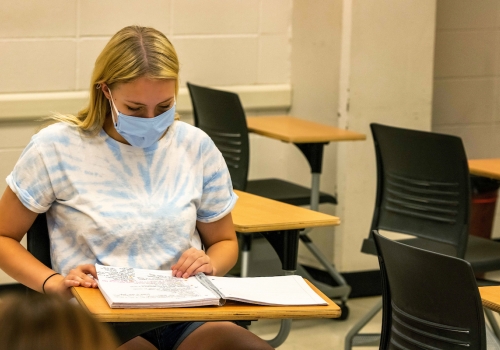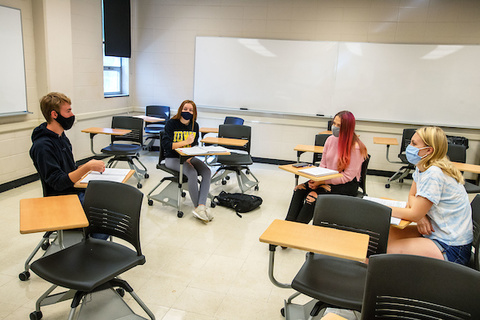
Recognizing the need to provide additional support to students during the pandemic, The Path Forward Student Success Work Group was formed to create learning interventions for students who would enroll in compressed Winter Interim Session courses. Guided by academic research and the expertise of Dr. Shaun Vecera, the group focused on the “3Ms” of learning: mindset, metacognition, and memory. When properly implemented in classrooms, the 3Ms can help students “learn how to learn” and “think about their thinking” process.
This story describes the experience of piloting the innovative learning strategies in the course ‘Diversity and Inclusion in Healthy Living’. This College of Liberal Arts and Sciences (CLAS) course offered by the Department of Health and Human Physiology fulfills the college’s Diversity and Inclusion General Education requirement.
Well, what happened?
With the support of the Office of Teaching, Learning & Technology and the Office of Academic Support and Retention, course instructor, Dr. Maria Richter, implemented metacognitive strategies in her course. Specifically, Dr. Richter utilized specific “Plan, Monitor, Evaluate” strategies to help students “think about their thinking”.

Plan. During the first week of class, students posted their Plan to the class discussion board, allowing students to normalize planning and learn from each other in the process. Dr. Richter provided prompt feedback to guide students forward.
Monitor. Part way through the four weeks, students completed a Monitor discussion post. Here, students reflected upon the current state of their semester. What was working? What wasn’t working? What could be changed? What interventions were needed to improve? Once again, students normalized self-reflection, self-regulation, and self-awareness while learning with and from each other.
Evaluate. Finally, students completed an Evaluation discussion post on the penultimate day of the course. In this post, students evaluated their learning process, not their grades in the course. Thus, the value of the course, the process of learning and the “thinking about thinking”, was analyzed as a process, separating their process from their course scores. Students reported important outcomes from this Plan, Monitor, Evaluate process.
Outcomes
Through the “Plan, Monitor, Evaluate” strategies, students reported the following outcomes.
- Students learned the effectiveness of consistent study habits. Recording and reflecting on their study habits helped students recognize problematic behaviors which hindered their learning. To illustrate, one student noticed the positive effect on her grade by allocating more time for exam preparation rather than cramming for the exam: “(In the first exam) I was able to spread out the material and really absorb what I was reading. It was noticeably different grade-wise compared to the second exam, where I only allotted three days of studying. [Cramped for time in the second exam preparation] it became quantity of material studied over the quality of the studying. Being aware of this through these monitoring exercises makes me want to continue working on my exam studying habits moving on to future classes.”
- Students learned the value of planning ahead. Learning to create effective plans is an important part of successfully navigating complex structures. At the conclusion of the course, a student reflected upon the value of creating a plan at the outset of the course to handle writing multiple papers in a short period of time: “When I first saw the syllabus, I was a bit daunted by the idea of writing 3 papers in 4 weeks. The Planning discussion helped me lay out my days for this class. I have gone from being terrified of writing such long papers, to actually enjoying writing them and finding a rhythm to writing!”
- Time management flourished. Learning to manage time effectively is a life-long skill. The cyclical process of creating and implementing a plan, monitoring progress, and critically evaluating oneself helped students gain time management skills. Multiple students commented upon their new ability to manage their time effectively: “I feel that since I monitored my progress in discussion 5, I have dramatically done better at keeping myself on track and managing my time in the course. I would often check ahead to see what I have due in the next few days rather than just focusing on what I have due today or tomorrow.” Another student shared: “I feel that I have learned how to use better time management through this course. For future courses, I will continue to manage my reading time better, so I have time to review notes and not cram the night before. This course also taught me that I need to slow down while taking exams and better use the whole testing period. I also learned a lot about myself personally and how I need to effectively manage my time!” Finally, another class member noted: “I need to develop a regular sleeping pattern and avoid using electronics and watching TV at least a half hour before going to bed. As my sleep will get better, I will have more energy throughout the day and be more productive in the mornings with better resulting time management.”

- Students gained confidence in the ability to process large amounts of information in a short period of time. Part of successful metacognition involves a growth mindset, where individuals believe in their ability to make positive improvements in themselves. With the growth mindset embedded into the class, many students found themselves stretching and changing in positive ways during the course, discovering that they can indeed do things once seeming difficult. One student noted: “I have always had trouble getting myself to read the text in a class. Usually, I can get away with focusing on assignments and lectures alone. This was not an option in this class, but I did find that I am more than capable of getting through a large amount of reading in a reasonable amount of time so hopefully I will be spending more time in my future courses reading the material.”
- Personal ownership of learning outcomes emerged. Finding ways to increase student accountability and ownership of the learning process is an important goal for higher education. A sense of self-empowered ability to direct learning outcomes appeared by the end of the course: “I feel that if I continue some of my study habits and assignment habits that I have developed over this course, I will be more successful in my last couple of semesters here at Iowa. I feel more prepared for an easy transition for the spring semester which will be beneficial, especially after being in an online learning routine already.” Students felt as if positive changes within themselves were possible: “There is definitely room for improvement in the future and something I’ll make sure to look at and fix within myself.”
- Our students are excited to use these metacognitive strategies in their future courses at Iowa. Helping students “learn how to learn” is a focal point of these metacognitive interventions. Hopefully, students will gain life-long skills to utilize in their academic, personal, and professional lives. Students stated they are ready to implement these strategies in their next life steps: “I feel I learned more about myself and how I can create success for my last semester in college. I feel that writing out my to-dos was great, but reminders on my phone do not work as well as having a physical calendar with my entire schedule and not just academics. I feel that I will continue this strategy in the future,” shared one student. Another shared: “I was proud of the way I organized around this class and I wish I would have had some of these tools earlier on in my college career.” Additionally, a classmate commented: “In my final semester that is about to start, I will encourage myself to stick to a strict schedule with a dedicated time frame for studying and reading. I need to incorporate more of a metacognitive approach to my learning. I think this method will help me significantly on exams and my overall performance in courses.” Finally, one student shared, “As a learner, I feel I have greatly improved.”
Conclusions
When students “think about their thinking”, they gain awareness of their own, unique learning process, building self-efficacy and a sense of control regarding their learning. Students coached in metacognitive strategies increase their self-regulation and intrinsic motivations for pursing learning as a necessary and sufficient ending in and of itself. Implementing metacognitive strategies in higher education classrooms gives our students the tools to “learn how to learn”, a valuable skill in our classrooms and the classroom called “life”.
What’s Next
Metacognitive strategies can help our students gain critical skills for inside and outside the classroom. The exciting part of this journey is that these metacognitive strategies are being implemented in courses for the spring 2021 semester. As we pilot these ideas in more courses, we will build resources for our fellow CLAS faculty members, with the goal of making the 3Ms of mindset, metacognition, and memory foundational aspect of our courses for our students. Currently, discussions are underway to scale the 3M strategies for the summer and fall 2021 sessions.